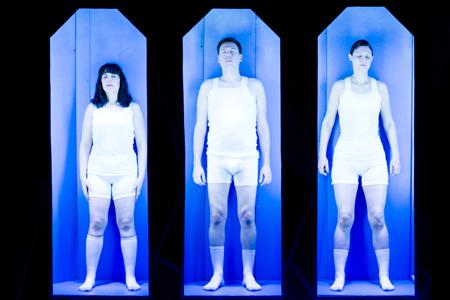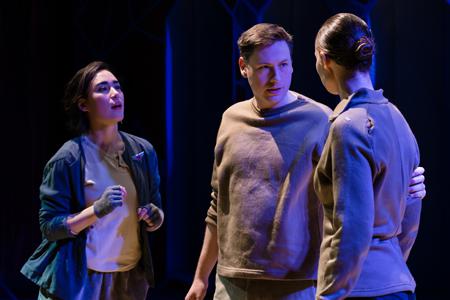Play (2016)
A Space Opera by
Kevin Mullins
Directed by Lindsay Eagle
Boston Public Works
Boston Center for the Arts
South End, Boston
January 8 – 23, 2016
With James Hayward (Marcus Kent), Melissa M. deJesus (Princess Evelyn Martus), Juliet Bowler (Lady Petrov), Kristen Heider (Rex T-1-5-23), Kathleen C. Lewis (Sydney “Sid” Azzi), Alissa Cordeiro ((Josephine Antonelli), David N. Rogers (Edward Lydell), Katharine Daly (Naomi Petrov), Johnny Quinones (Griffin Petrov), Michael John Ciszewski (Rafi Bowman)

James Haward as Marcus Kent
Kirsten Heider as Rex
in “Citizens of the Empire”
Photo: Jake Scaltreto
Courtesy of Boston Public Works
Boston Public Works is a consortium of playwrights who support one another in productions of each other’s works. It’s a lovely idea and seems to help avoid some of the normal difficulties of drumming up a production of one’s work.
The ordinary competitive process of submitting plays to an endless stream of theaters, so wrought with Darwinian overtones, might, one think, winnow out rudimentary efforts. Such is not the case; there are plenty of bad plays given productions by theaters which select them after a highly competitive process. Here, of course, in a supportive collaborative, that Darwinian process, however flawed it is in practice, is eliminated; given that, one wonders how much internal vetting and mutual critique of the participants’ works goes on in advance of a production, and how much is left to simply mounting the participants’ written efforts as a way of testing their quality.
The current outing, described as a Space Opera, is not really an opera at all. It is a play that has, at various points, some incidental music in the background. There is certainly no singing and no original music. It’s not clear why the author gives it this subtitle, except that its somewhat epic narrative scope and tone might be considered, in some sense, operatic.
The North Cambridge Family Opera, a nice, participatory amateur group that includes adults and children equally in its productions, did produce a number of years ago something actually called Space Opera which was indeed a full tilt musical production.

James Haward as Marcus Kent
Kirsten Heider as Rex
in “Citizens of the Empire”
Photo: Jake Scaltreto
Courtesy of Boston Public Works
Citizens of the Empire is nothing like that. Rather, it is a very long – two and a half hours – intergalactic epic about a space empire and various rebellions within it. Included are portrayals of a family of evil capitalists (oddly with the Russian name of Petrov), a princess (Melissa M. de Jesus) who theoretically rules over the empire in a kind of benevolent inheritance from her infirm father, and various robots and rebels of all sorts.
There is a lot of elaborate politics described at length in the production, and not in an abbreviated way. The play seems to model itself quite discernibly after many of the ideas and themes in the Star Wars (1977 -) epic. The princess, the rebels, the robots all are quite derivative from that narrative. There even are a few fencing scenes with standard sabres, which seems like a bizarre reinterpretation of the light sabre battles from Star Wars.
The play also seems to make the same mistake that the second set of Star Wars films, released between 1999 and 2005, made, which was to overindulge in endless details about political machinations in the empire and to forget the core hero story. The recent Star Wars: The Force Awakens (2015), revived that old hero story and has, as a result, become a major hit.
The production values of the play are rudimentary, which gives it a kind of not unwelcome kitschy flavor. However, that flavor is really at odds with the seeming seriousness of the tone of the play. Had the playwright opted to make this a satirical comedy rather than a drawn-out epic, the whole thing would probably have worked much better. The way it is, it seems like a far lesser imitation of the established and well-known space epic rather than a goof on it and its kind.
James Hayward (Marcus Kent) as the rebel hero provides a forthright and palpable nobility. As the princess, Melissa de Jesus offers an distinctively appropriate irritated dignity. Kristen Heider exhibits a robot presence which is sufficiently creepy and Juliet Bowler, as Lady Petrov, establishes a frighteningly domineering presence. As Sid, Kathleen C. Lewis conveys a notably stylish rough-and-readiness.
The one innovation the playwright offers is that a number of the heroes are gay; men couples and women couples embrace and kiss. One doesn’t find that, as yet, in Star Wars.
– BADMan
Other problems aside, were you aware that “space opera” is a well-known genre term that was coined in 1941 and is well in use in the literary world?
The definition of a space opera is: a novel, movie, or television program set in outer space, typically of a simplistic and melodramatic nature. No music required 🙂 Star Wars is a great example, actually!